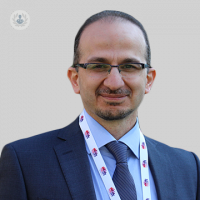The latest in treating diabetes and obesity – the 1st International Bariatric Club World Congress
Written by:Mr Ali Alhamdani, highly respected consultant laparoscopic, bariatric and general surgeon, was recently invited to speak at the first International Bariatric Club World Congress held at Oxford University this year, where he shared his expertise in treating diabetes in obese patients. We caught up with Mr Alhamdani to ask him about his experience.
What is the International Bariatric Club World Congress?
The International Bariatric Club World Congress held in Oxford this year was the first one of its kind. Surgeons from all over the world met to discuss controversial issues in bariatric surgery. Over the past few years, there have been symposiums about specific subjects all over the world, but this was the first time that all bariatric surgeons of this club have come together. The event included more than 300 surgeons from more than 100 different countries.
Why were you invited?
Different surgeons specialise in different aspects of obesity surgery. I was invited to speak about one of my areas of expertise – the best way to treat diabetes in obese patients.
What did you talk about?
We discussed different procedures, and treatments that suit patients. The talks and debates were streamed live as online sessions.
Treatment for diabetes in general can vary from medical treatment to surgical treatment for type 2 diabetes, where the patients are usually obese. One of my interests is trying to find the best surgical solution for them.
For obese patients, weight loss surgery is the most effective known way not only to lose weight but also to maintain weight loss, according to worldwide literature on the subject. We know from studies that if your BMI is forty or above then the chance of being diabetic is more than ninety per cent. The most recent publication from NICE (The National Institute of Clinical Excellence) tells us that if morbidly obese patients lose weight and maintain that weight loss, they will live ten years longer. Treating obesity can stop progression of diabetes and can even cause remission.
All weight loss surgery can help with diabetes remission. However, gastric bypass surgery – particularly its new form, which is called a mini gastric bypass – can give patients even better and more consistent result.
Did you all agree on the best way to treat diabetes in obese patients?
Of course there were debates – everyone has different experiences. Some surgeons believe that obesity coupled with diabetes is a chronic disease and, therefore, the treatment has to be given in stages, starting from small procedures and building to bigger ones. For example, this could mean starting with a gastric band, then if it fails, moving up to a gastric sleeve, and if that fails, a gastric bypass, and so on.
However, in my opinion, patients should be given best chance and the most effective, optimal treatment from the start – bypass straight away if it’s most effective and suitable for that patient. This gives the patient the best chance to recover from diabetes. The reason I don’t advocate the staged approach is that it’s not safe for the patient to go through multiple operations. The more operations a patient has, the higher the risk of having intra-abdominal complications like bleeding, leaking, and bowel injuries.
In addition to this, in the current climate, trying to fund a second or third operation can be extremely difficult; a few commissioning boards across the UK have stopped funding any revisional surgery (second surgery) and they can barely fund a very limited number of patients to have only one (primary) operation. Many patients are still on waiting lists for their first!
By choosing the best option from start, the patient may not require any further surgery and it will give the best chance cure diabetes. I believe this is the safest and most effective way to treat diabetes in morbidly obese patients.
What does it mean to you to have been invited?
I was very honoured to have been invited, among the most famous and most experienced people in the field. I feel really privileged, very happy with the results; there was an excellent atmosphere, and it was a great experience.
What’s next for you?
I am invited to the Middle East Obesity Surgery Congress in July. I am also participating with a new paper in the International Obesity Conference in September this year.
Mr Alhamdani is regarded as one of the UK's leading consultant bariatric surgeons. To schedule a consultation with him, visit his Top Doctors profile today.




